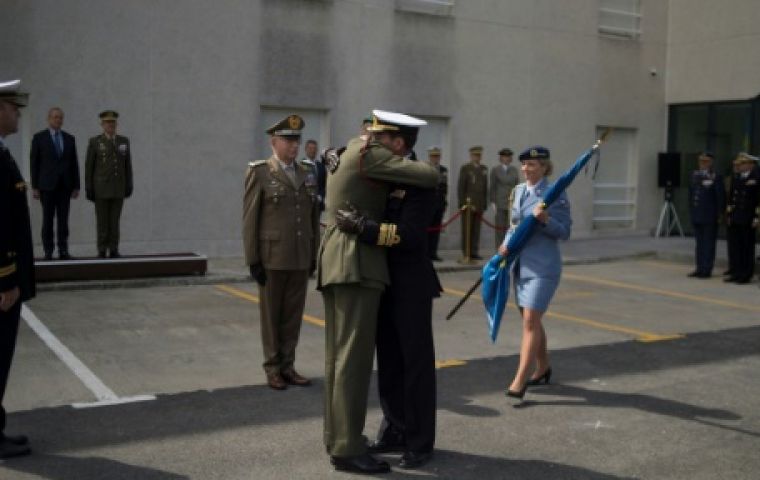MercoPress. South Atlantic News Agency
Brexit: Spain takes over UK maritime duties combating piracy off Somalia
 Spanish V/Admiral Antonio Martorell relieved British major general Charlie Strickland as commander of the so-called “Operation Atalanta”
Spanish V/Admiral Antonio Martorell relieved British major general Charlie Strickland as commander of the so-called “Operation Atalanta” Spain on Friday took over from Britain command of a European Union maritime mission that combats piracy off the coast of Somalia as Britain's planned departure from the bloc nears.
Spanish vice admiral Antonio Martorell relieved British major general Charlie Strickland as commander of the so-called “Operation Atalanta” during a solemn ceremony held at the Rota naval base in southern Spain, where US troop are also stationed.
The ceremony was held on the day Britain was originally set to leave the European Union. British lawmakers voted down an unpopular divorce deal for a third time on Friday.
“It is honestly a sad day for the UK ... but it is an exciting day for Spain,” Strickland said during the ceremony.
“Atalanta is so much more than ships in the Indian Ocean and aircrafts in the skies. Atalanta is a sophisticated multilayered operation using hard and soft power to continue to suppress piracy and to take a powerful role in the broader security architecture of this key region of the world.”
The European Council announced in July that it would transfer the headquarters of Atalanta which employs 101 people from Northwood outside of London to Rota.
The operation's headquarters is just one of the European institutions which Britain is losing as a result of its impending EU exit.
The European Medicines Agency moved to Amsterdam while the European Banking Authority was relocated to Paris.
While Spain took over the Atalanta's command centre, France's historic naval base in Brest on the tip of Brittany won the Maritime Security Centre of Africa which was also based in Northwood.
The EU launched Atalanta in 2008 to fight brazen acts of piracy off the coast of Somalia, including the spectacular hijacking of a Spanish tuna boat in 2009.
The number of attacks off the coast of Somalia in the Indian Ocean has fallen from a peak of 176 in 2011 to just two in 2018, according to Atalanta.
The European Union has extended Operation Atalanta to 2020 and gave it a budget of €12 million for 2019 and 2020.
Italy had also sought to win the headquarters of Atalanta. It had proposed that it be moved to a base in Rome which already holds the headquarters of Operation Sophia against smugglers of migrants in the central Mediterranean.




Top Comments
Disclaimer & comment rules-

-

-

Read all commentsOne of the reasons the Somali's turned to piracy was that the Spanish fishing fleet took all the fish in Somali waters, as they do worldwide.
Mar 30th, 2019 - 10:12 pm 0Typical racist Brexiteer's comments... By the way, How is our British fishing industry doing after we tried to bully little Iceland off their cod?
Mar 31st, 2019 - 10:35 am 0Read the House of Commons Foreign Affairs Committee report in Pirate off the coast of Somalia:
Somali pirates are usually characterized in one of two ways. The first description of the pirate groups accords to a broadly sympathetic narrative in which they are former fishermen who were forced to protect their waters from illegal fishing and dumping of waste following the breakdown of order in Somalia. Some of the pirate groups encourage this description, even naming some of their groups as the 'coastguard' and making reference to the acts of piracy as a kind of 'tax' on the illegal fishing vessels. However, the UN Monitoring Group on Somalia noted that only 6.5% of Somali piracy attacks have been against fishing vessels: the vast majority of piracy over the last four years has been against larger, merchant vessels carrying goods between east and west. An alternative view of the pirate groups is less romantic, depicting the groups as “simple maritime criminals”, many of whom were never fishermen but rather were attracted by the lucrative illegal gains from piracy, and who have established a large-scale criminal enterprise which is actively harming development in Somalia.
Piracy is much more lucrative than “fishing”!
Mar 31st, 2019 - 04:06 pm 0Commenting for this story is now closed.
If you have a Facebook account, become a fan and comment on our Facebook Page!